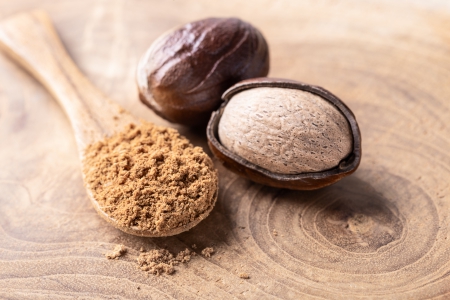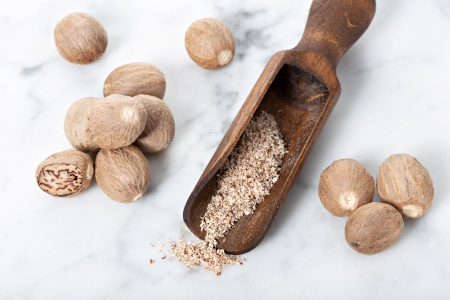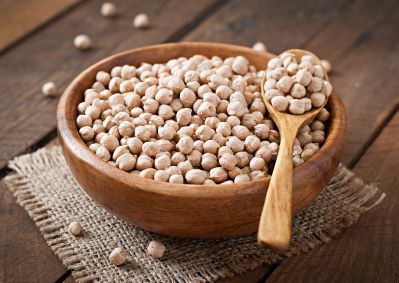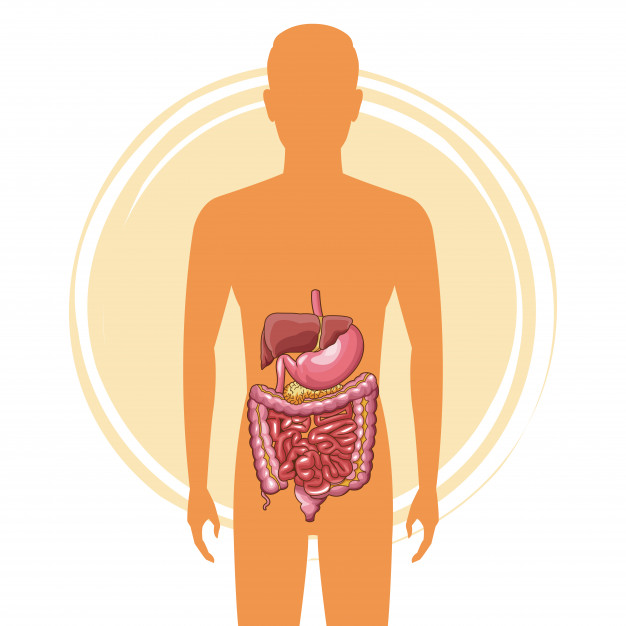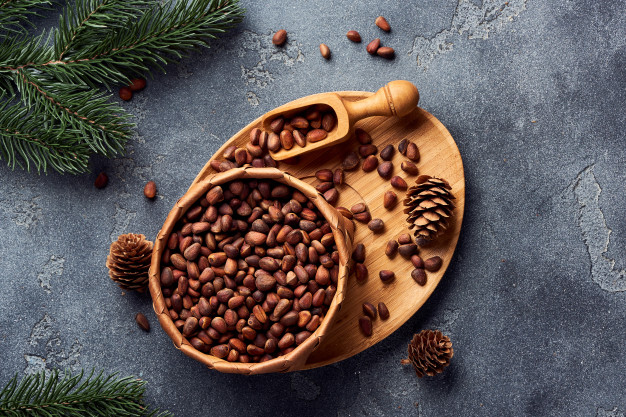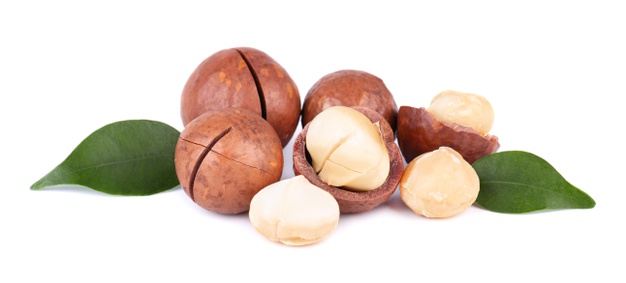Nutmeg is an important spice obtained from the seed of nutmeg tree also known as Myristica fragrant. It has several health benefits and has been used for centuries for medicinal and culinary purposes.
Characteristics
- It is orange in color
- It is slightly sweet in taste
- It has a pungent smell
Nutritional composition
- It contains desirable amount of carbohydrates and dietary fibre
- It contains both saturated and unsaturated fat, but it is completely free from cholesterol
- It contains lesser amounts of proteins
- It provides significant amount of calorie on its oxidation due to its carbohydrate and fat contents
- It contains various vitamins like Vitamin A, Vitamin C, niacin and pyridoxine
- It also contains several minerals such as calcium, magnesium, sodium, potassium, iron, copper, manganese
- It contains numerous important volatile oils, which include elemicin, safrole, myristicin and eugenol
- It also contains many biologically active compounds like d-pinene, d-borneol, geraniol, limonene, l-terpineol, derivatives of propylbenzene and allylbenzene
Whole nutmeg and ground nutmeg
Whole and ground both nutmegs are used in cooking. Whole nutmeg has the similar size with apricot pit. Ground nutmeg is the powdered form it can also derive by grating nutmeg seed and can be directly applied into recipes, which imparts comparatively cleaner and fresher taste. Whole nutmeg has long shelf life and can be preserved for a long period of time. On a contrary ground nutmeg or pre-ground nutmeg has short shelf life, cannot preserve for long time.

Nutmeg and mace
Nutmeg and mace both are spices derived from same tree but there are some differences between these two spices, which include –
- Mace is the outer layer of the nutmeg seed, which is generally removed and then ground to a red colored spice. Whereas nutmeg is the inner seed that can be utilized in whole or ground form
- Nutmeg is comparatively sweeter than mace
- On a contrary mace is comparatively spicier than nutmeg
- Nutmeg is relatively delicate than mace
Biological properties
Nutmeg contains numerous biologically active compounds which exert several biological properties that include –
Anti-carcinogenic property - helps to prevent the susceptibility of developing cancers (especially leukemia). Myristicin component of nutmeg is the principle component accountable for reducing the growth of cancerous cell
Antidepressant property - exerts calming effect that helps to prevent depression, stress and anxiety
Diaphoretic activity - helps to increase perspiration
Diuretic activity - helps to increase water excretion
Antimicrobial activity - helps to prevent the growth and reproduction of microbes within host
Aphrodisiac activity - helps to improve sexual desire
Antioxidant activity - helps to prevent oxidative damages of body by reducing free radicals concentration

Health benefits
Role on circulatory system
- Nutmeg is filled with several important trace elements like iron, potassium, calcium, sodium, manganese that play significant role in regulating blood pressure
- It helps to enhance blood circulation throughout the body and hence promotes the supply of oxygen and nutrients to every cell
Role on skin
- Anti-inflammatory and antimicrobial properties of nutmeg are responsible for promoting skin health
- It helps to treat acne
- It also helps to unclog pores
- It helps to reduce blackheads
- It is considered as an effective tool for preventing pimples. It has seen that application of ground nutmeg along with honey on pimple shows significant effect
- It also acts as a useful face scrub
Role on hair
- It has seen that usage of nutmeg is beneficial for reducing hair fall
- It helps to promote hair growth and enhances hair volume as well
- Its antimicrobial property is responsible for keeping the scalp clean that helps to reduce dandruff
Role on preventing insomnia

- It has a calming as well as de-stressing effects that help to promote healthy sleeping
- It has seen that several mothers use nutmeg for their babies. They used to give warm milk to their babies with a pinch of nutmeg powder for facilitating sleep
- It is one of the most important organic substance used for treating insomnia and can easily replaces the use of sleeping pills and their harmful consequences
Role on detoxifying the body
- It is associated with removing toxins from body
- It has seen that it stimulates the detoxification process by enhancing hepatic functionality and facilitates excretion of waste materials by improving renal activities
- Antimicrobial activities of nutmeg also help to prevent microbial infestation within body and protect the body from harmful infections
Role on enhancing immunity
- Anti-inflammatory, antimicrobial activities and micronutrients components of nutmeg are responsible for promoting immunological responses of the body that enhances resistance power
- It helps to reduce the susceptibility of developing communicable diseases
Medicinal usages
Role on improving brain health
- Being an aphrodisiac, nutmeg helps to stimulate nerves that promotes brain functionality
- It helps to improve mood, memory and cognitive ability
- It also acts as an adaptogen that helps to exert stimulating as well as sedative effects according to the need of the body. It can reduce blood pressure during stress condition that helps to cope up with stress. It also helps to stimulate nervous system that helps to prevent tiredness and helps in refreshment

Role on digestive health
- Essential oils of nutmeg have carminative effects that help to prevent flatulence
- It promotes digestion by enhancing the secretion of digestive juice hence it is better to consume any stews or soups or curries added with nutmeg powder
- It helps to prevent diarrhea
- It also helps to reduce the prevalence of ulceration
- Fibre content of nutmeg is accountable for improving bowel movement and peristalsis that help to promote colonic health and helps in easy defecation
Role on improving hepatic health
- Myrislignan component of nutmeg is the principal component responsible for protecting liver from injuries and helps to reduces the prevalence of liver disorders
- Anti-inflammatory activity of nutmeg helps to prevent hepatic inflammatory events that promotes hepatic functionality
It is widely used on inflamed area for relieving pain. It has seen that it shows significant effect in reducing the pain of joint swelling (arthritis). It is also used for reducing headache and muscle pain

It helps to reduce the concentration of cholesterol and helps to regulate lipid profile
It also used to promote oral health by preventing microbial infestation within oral cavity and improves bad oral odor
It helps to increase metabolism as well hence helps in weight reduction
Culinary usages
- Nutmeg has been traditionally used for culinary purposes and it is extensively used in sweet and in spicy dishes
- As mentioned above it can be added to soups, sauce and stew before consumption
- It can be used in potato dishes
- It can also be used in baked items, spice cakes, cookies
- It can be consumed combined with soufflés and cheese
- It can be also added with custard and pudding
Risk factors
Excessive consumption of nutmeg is associated with developing various health hazards, which include –
- Gastrointestinal disturbances liker diarrhea, bloating, stomach pain, indigestion, constipation
- Palpitation
- Hallucination
- Irregular heartbeat
So, it is better to consume nutmeg in required amount to avoid the risks.
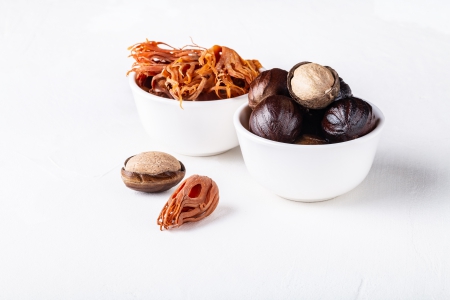
Source:
Agaus, L.R. and Agaus, R.V., 2019. Manfaat Kesehatan Tanaman Pala (Myristica fragrans)(Health Benefits of Nutmeg (Myristica fragrans)). MEDULA, 6(3).
Astuti, I.Y. and Rahmadini, R.S., 2020. Formulation Optimization of Nutmeg Oil Nanoemulsion. Current Trends in Biotechnology & Pharmacy.
Beckerman, B. and Persaud, H., 2019. Nutmeg overdose: spice not so nice. Complementary therapies in medicine, 46, pp.44-46.
Dhaslin, Y.F., Issac, R. and Prabha, M.L., 2019. Antioxidant, antimicrobial, and health benefits of nutmeg. Drug Invention Today, 12(1).
Loizzo, M.R., Sicari, V., Tenuta, M.C., Leporini, M.R., Falco, T., Pellicanò, T.M., Menichini, F. and Tundis, R., 2016. Phytochemicals content, antioxidant and hypoglycaemic activities of commercial nutmeg mace (Myristica fragrans L.) and pimento (Pimenta dioica (L.) Merr.). International Journal of Food Science & Technology, 51(9), pp.2057-2063.
Periasamy, G., Karim, A., Gibrelibanos, M. and Gebremedhin, G., 2016. Nutmeg (Myristica fragrans Houtt.) oils. In Essential Oils in Food Preservation, Flavor and Safety (pp. 607-616). Academic Press.
Ulfah, T., Hardjomidjodjo, H.H. and Anggraeni, E., 2020, April. Nutmeg determination as the main commodity in South Aceh; a literature review. In IOP Conference Series: Earth and Environmental Science (Vol. 472, No. 1, p. 012040). IOP Publishing.
